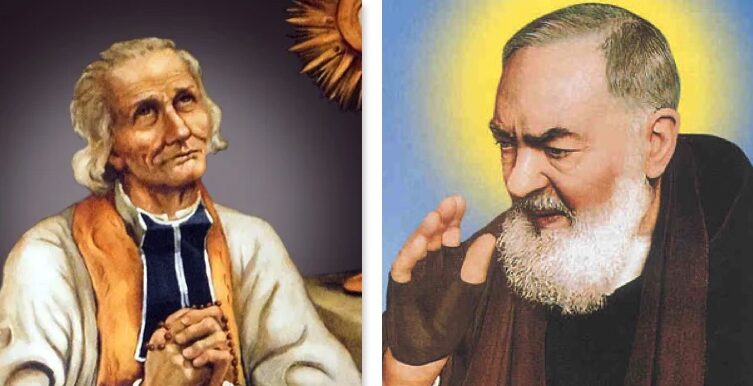Many modernist-heretics since the 1970s have purposefully conflated the requirement to receive Holy Communion in a state of grace with the notion of receiving Holy Communion in a state of perfection. This is purposeful and diabolical ambiguity. The Bible and the Catholic Church have always taught that one must receive Holy Communion in “a state of grace.” One need not be in a “state of perfection” (normally seen as the unitive stage of prayer, or the religious state or the state of being a bishop) to receive Holy Communion.
In light of the above purposeful-conflation, modernist heretics since the 1970s have often said things like “The Eucharist is not a prize for the perfect” in order to deceive those in mortal sin to approach the Eucharist. Yes, it really is that deliberate, and it really is that evil. Perhaps such modernist-heretics were deceived by other modernist-heretics into saying that, but the malice on that phrase started somewhere. Nowadays, even you-know-who says it.
Strangely, the diabolical-deceit surrounding the line “The Eucharist is not a prize for the perfect” is that it is explicitly true. But like all heresy, it implies the wrong thing. In this case, that phrase overturns the teaching of the Bible and the Catholic Church that those in mortal sin may not receive Holy Communion. (If you are baptized and you are not sure if you’re in mortal sin, you may find helpful my article 15 Mortal Sins Most Catholics Are Missing which has now helped nearly a million souls.)
How do we know that the Magisterium teach that those in venial sin may indeed receive Holy Communion but those in mortal sin may not? First of all, the Bible (the highest written form of the Magisterium) itself clearly delineates between deadly (mortal) sin and non-deadly (venial) here:
If anyone sees his brother committing a sin not leading to death, he shall ask, and God will give him life—to those who commit sins that do not lead to death. There is sin that leads to death; I do not say that one should pray for that. All wrongdoing is sin, but there is sin that does not lead to death.—1 John 5:16-17.
Then, we have the Holy Spirit’s warning through St. Paul that a person who receives Holy Communion in a state of mortal sin places himself under God’s own judgment:
For anyone who eats and drinks without discerning the body eats and drinks judgment on himself.—1 Cor 11:29.
But wait a minute—don’t many sins call down God’s judgment? Yes, but the infallible Council of Trent issues this shocking warning: “For no crime is there heavier punishment to be feared from God than for the unholy or irreligious use” of the Eucharist.—Trent, De Euch v.i.
Now let’s see what the saints say about receiving Holy Communion in a state of mortal sin:
- “But I wish to emphasize this point: Have a clear conscience. Otherwise, for you, the Bread of Life will be a Bread of Death. This does not mean that the Holy Eucharist was meant to be your death, but only that, even before receiving Him, you were already dead. And you are so in a double-sense [dead] after receiving Him.”—St. Julian Eymard, On Holy Communion p. 11.
- “No, my dear brethren, I do not wish to talk to you today about those unfortunate people who tell only half their sins through fear of not making their Easter duty or of being refused absolution—perhaps even for the sake of covering up their shameful lives with the veil of virtue and who, in this state, approach the altar and are going to complete their dreadful work by handing over their God to the Devil and precipitating their sacrilegious souls into Hell.”—St. John Vianney (top-left in featured image) in his sermon titled Annual Confession.
- Almost prophesying the 20th century’s deceitful (and purposeful) conflation of being in a state of grace versus being a state of perfection, Padre Pio (top-right in featured image) said: “It is quite true, we are not worthy of such a gift. However, to approach the Blessed Sacrament in a state of mortal sin is one thing, and to be unworthy, quite another. All of us are unworthy, but it is He who invites us. It is He who desires it. Let us humble ourselves and receive Him with a heart contrite and full of love.”
